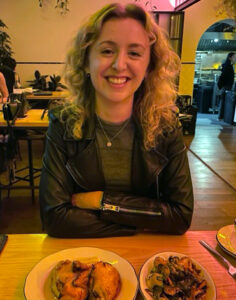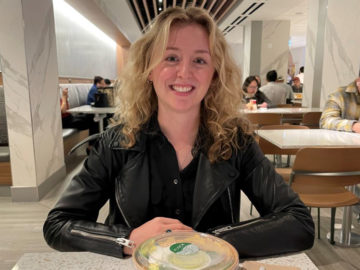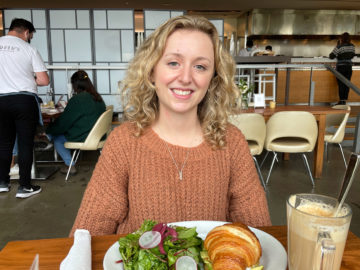Adult Allergies
From ‘Phantom’ Reactions to Taming My Food Allergy Anxiety
I came to see the difference between real and 'phantom' food allergy reactions. Skills my parents taught me and rationale thinking are helping me to live my best life.
As someone with allergies to tree nuts and peanuts, I can attest: food allergy anxiety is real. In fact, I’ve had my share of anxiety-induced “phantom” allergic reactions.
Take the time as a teenager when I ordered a piece of cheesecake at a restaurant. Our server assured me that it was safe. What a thrill, I could have dessert! I was half-finished my slice when the server came rushing back to the table to tell me there was peanut oil in the cheesecake.
Immediately, I began panicking and felt the symptoms of an allergic reaction suddenly appear. This despite the fact that I’d been absolutely fine before the server came rushing back to our table. I went to the restroom with my mom, who helped me calm down and was quite skeptical of the server’s assertion.
From a baking perspective, she felt it didn’t make sense. Why would a major chain restaurant use peanut oil to make a plain cheesecake?
After some time, I realized that I was not in fact having an allergic reaction. It turned out that I’d been so anxious about the possibility of a reaction that I began having phantom symptoms. They weren’t real, this was a panic attack. Once I calmed down, I realized that I was totally fine and my mom was right – the server had made a mistake.
Managing a Phantom Reaction
This teenage experience taught me that phantom reactions are real. For me, a phantom reaction is when I think I’m experiencing allergic reaction symptoms because I’m nervous I’ve consumed my allergen, but don’t have any evidence of that being true.
Phantom reactions are scary because it can be difficult to determine what is real and what’s not. If I start panicking that I’m having allergic reaction symptoms, I know that I need to be extra kind to myself. I try to stay as calm as possible so I can figure out whether my symptoms are real.
To manage my food allergy anxiety, I use education and self-reasoning. I was recently at a restaurant and saw something that looked like a small piece of peanut in a dish we had ordered. I started to panic and become hyper-aware of my body. Was my tongue itchy? Were my lips swelling? I wasn’t able to tell whether my ‘symptoms’ were real or perceived.
I tried to calm myself down by taking deep breaths and engaging in conversation. After a few more minutes, I realized I was completely fine. My ‘reaction’ was entirely my body’s anxiety response.
This happens to me every so often. Over time, I’ve learned to slow down my thoughts and breathe deeply, realizing that I’m having an anxiety response and not an allergic reaction. It helps this process that I always have my epinephrine auto-injectors with me, in case it did turn out to be a progressing reaction.
Allergens Exist in the World
My food allergy anxiety – and the risk of a phantom reaction – is worse when there’s a lack of control. At home, I almost never worry about consuming my allergen.

When I go out to eat, or go to the office, I can’t exercise the same level of control over my environment. I have to substitute control for food allergy management skills. These include washing my hands, being outspoken with servers about my food allergies, and doing visual inspections of my food.
These are skills my parents taught me as a child with food allergies, and as an adult I regularly put them to use. The fact is that your allergens exist in the world, and you need to learn how to manage when avoidance simply isn’t possible.
People without food allergies often ask whether my allergy is airborne. But I’m aware that such reactions are only known to occur in specific situations such as when foods like fish or milk are steamed. (For more on when there is airborne risk, see this article by Dr. Scott Sicherer). Often, if you think you’re having an allergic reaction to the smell of your allergen, it may be an anxiety response, not the real thing. I’m grateful to be aware of this.
Allergens in the Household
What also helps me manage anxiety is that my parents didn’t shelter me from my allergens. At home, they ate whole nuts (but not nut butters) as part of their diet, taking great care to avoid cross-contact. I didn’t think anything of this as a child. But as a young adult, I now realize that this is somewhat unusual for households with anaphylactic children.
To keep or not keep allergens in the home is obviously a personal choice, and may be influenced by whether there’s more than one child with allergies. Yet, I’m glad I was exposed (safely) to the presence of nuts at home. My family appreciated from an early age that I would have to live in a world with my allergens.
Despite my occasional phantom reaction, I have learned that I can be in a room with nuts, and not be affected. Although my allergies are severe, there’s no need to panic.
Yes, I can eat at an allergy-aware restaurant that serves dishes with my allergens and be OK. It is not necessary to demonize the mere presence of our allergens. I can trust in my food allergy management skills and exercise caution – without restricting my lifestyle.
Reducing Phantom Reaction Risk
If you struggle with food allergy anxiety, but want to challenge yourself, you can start by taking baby steps. Plan to go to a new restaurant with a trusted friend and (of course) your epinephrine auto-injector. Review the menu online in advance and select what seems like a safe option. Before you order, inform your server of your allergies, and ask that they tell the kitchen.
When your food arrives, do a visual inspection. You can even ask your friend to taste it for extra comfort (I often have a dining companion do this when something on my plate looks or smells suspicious.) If you’re still not comfortable, don’t hesitate to ask your server to double-check with the kitchen that your dish is safe.
These are all strategies I employ on a regular basis to manage my food allergies – and my allergy anxiety – while dining out. I find that having this checklist helps make me feel less stressed about my meal.
Managing Office Anxiety
If other contexts are more anxiety-inducing for you – like being at a party where nuts are part of a charcuterie board, or sitting beside someone eating a peanut butter sandwich at work – other strategies may be more helpful for easing anxiety. (This could include seeing a therapist, who can work with you on anxiety more broadly.)
It could be that speaking to your peanut sandwich eating co-worker will ease your stress. For example, you could say: “I have a severe allergy and cross-contamination is a concern for me. Do you mind taking extra care when you eat peanut butter and making sure you wash your hands after?”
When I am near someone eating peanuts or nuts, I have to be extra kind to myself. I remember that I am safe so long as I do not consume my allergen. Even though the smell makes me gag, I won’t react to it. Reminding myself of this, as well as being open about my food allergies, reduces my own anxiety – and the chance of one of those phantom reactions.
In the bigger picture, I am hopeful about becoming increasingly better at managing food allergy anxiety. I believe that none of us wants to let food allergies to hold us back from living out our dreams – and the life we want.
Allergic Living contributor Hannah Lank is an associate lawyer practicing in Toronto.
Related Reading:
When is There a Risk of an Airborne Food Allergy Reaction?
Allergic Living’s Anxiety Guide E-Magazine
FAACT on Signs of Allergy Anxiety in Food-Allergic Kids, Teens


